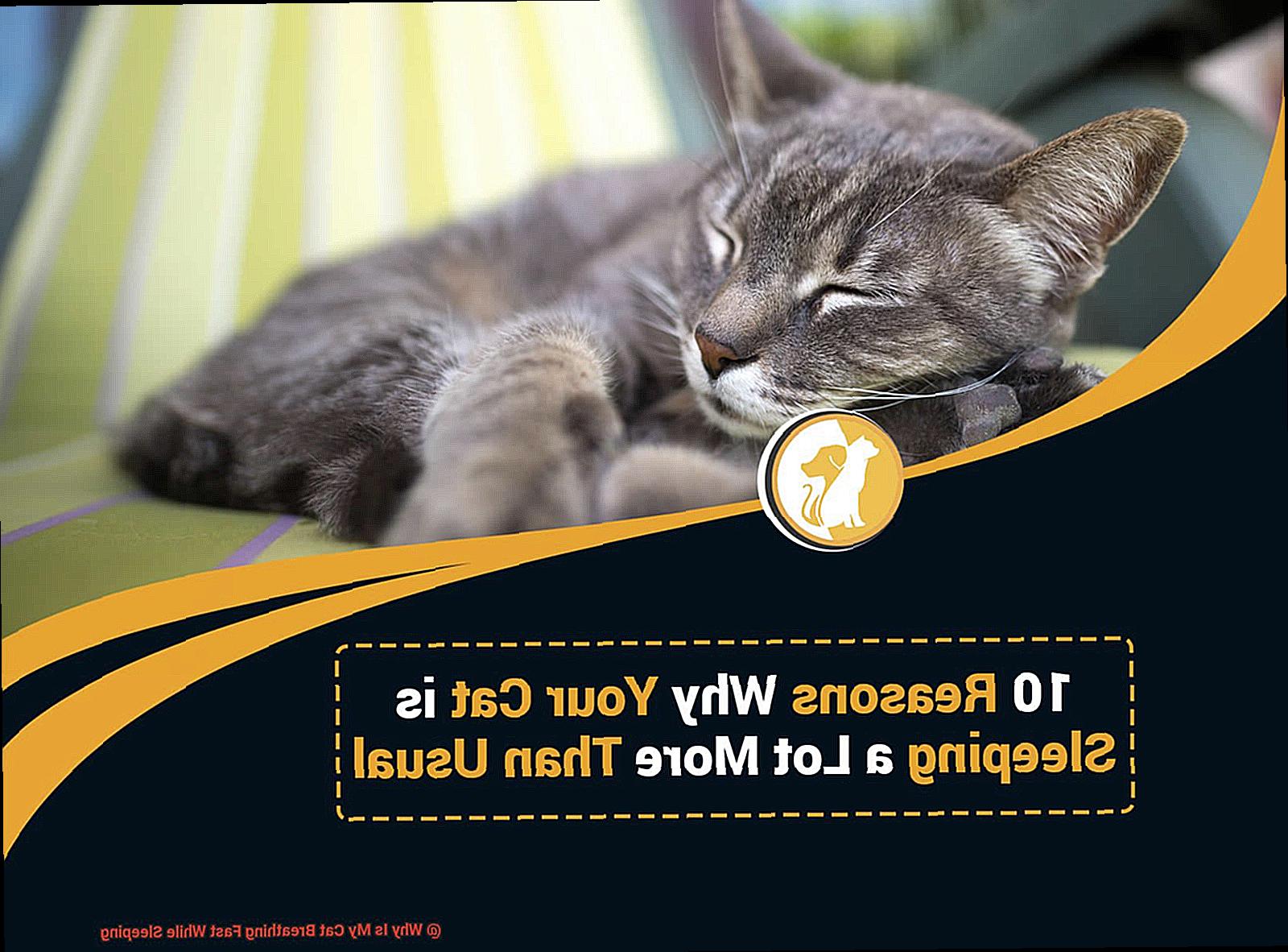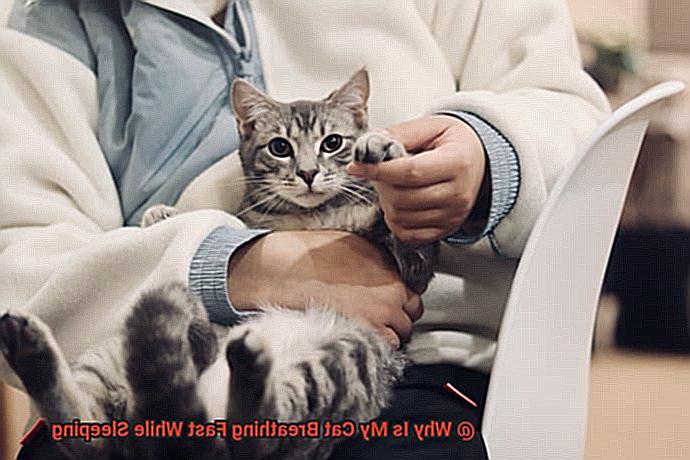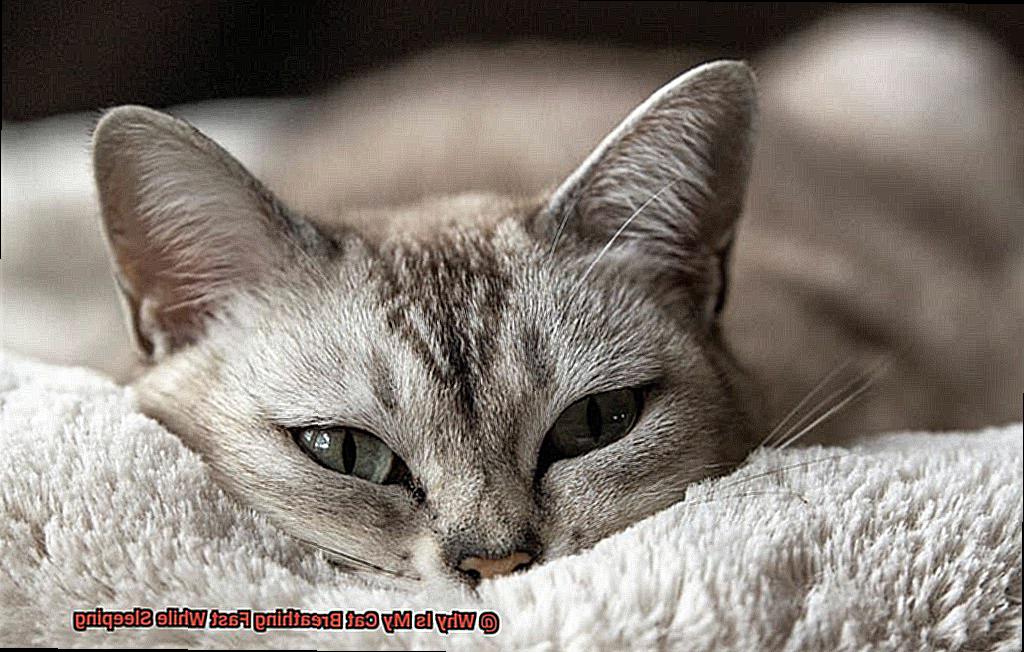Have you ever noticed your cat breathing faster than normal when they’re asleep? If so, you may be wondering what’s going on.
You may also be concerned that something is wrong with your pet.
The good news is that there are common explanations for why cats breathe faster when they sleep.

Understanding these causes can help ease your mind and keep your cat healthy and happy.
This blog post is for you if you’ve ever wondered why your cat breathes faster when they sleep.
We’ll explore the various reasons, from basic body functions to medical conditions.
In addition, we’ll discuss how to ensure your cat gets the restful sleep they need, as well as what signs to look for if you suspect a health condition.
Let’s find out!
Why Do Cats Breathe Faster While Sleeping?
It turns out that this is an interesting phenomenon that is related to their bodies’ natural inclination to relaxation.
When cats are in deep sleep, their muscles relax, leading to faster breathing.

This helps regulate their body temperature, keeping them warm and comfortable as they rest.
In some cases, cats may breathe faster due to excitement or stress.
If your cat is scared or ill, their heart rate will increase, resulting in rapid breathing.
It’s important to monitor your cat’s behavior and make sure they are not overly stressed out.

In some instances, cats may be able to breathe faster due to an underlying medical condition such as asthma, allergies, or heart disease.

If your cat is coughing while asleep, it is essential to take them to the vet for a checkup.

Certain medications can also cause cats to breathe faster while sleeping, so it’s important to talk with your veterinarian about any drugs your cat may be taking.
Overall, cats have an instinctual response of relaxation when they sleep, which helps regulate their body temperature and keep them comfortable.
How to Tell If Your Cat Is Breathing Too Quickly While Sleeping
It’s important to know what the average breathing rate for cats is so that you can tell when something is wrong.
Cats usually sleep more as a result of their REM cycles, but if your cat is breathing abnormally fast, it could indicate an underlying medical disorder.
Here are five ways to tell if your cat is having trouble breathing:
Check your cat’s nose
The normal breathing rate of a cat should be between ten and thirty breaths per minute.
To see if your cat is breathing fast while asleep, take a look at their nose.
If their nostrils are flaring or their breathing is labored, this may signify a problem.
Listen to their breathing
You should also listen to your cat’s breathing when they are sleeping.

If you hear any wheezing or gurgling sounds, this could be a sign of distress and should not be ignored.
Observe their chest movements
Pay attention to how much your cat’s chest is moving when they are asleep.
If it seems that it is more than usual, this could be an indication that something is wrong with their respiratory pattern and needs to be addressed right away.
Look for other signs of illness
Keep an eye out for other signs of illness such as coughing, sneezing, or loss of appetite, which could all indicate that something is wrong with your cat’s respiratory system and they may need medical attention immediately.
Visit the vet
If you’re concerned about your cat’s breathing, take them to the vet for a checkup as soon as possible so they can diagnose any underlying causes and provide the correct treatment plan for them to get better quickly and safely.
Is It Normal for Cats To Breathe Fast While Sleeping?
It’s a common question for cat owners, and the answer is yes. Cats usually take 20–40 breaths per minute when they’re awake, but this can increase to up to 60 breaths per minute while they sleep.
Additionally, cats may have periods of rapid breathing during their sleep, which is completely normal.
However, it’s important to note that rapid breathing could be caused by an underlying medical condition such as asthma.
If your cat’s breathing is consistently fast or if you notice any other concerning symptoms, it’s best to take them to the vet for a check-up.
Ultimately, it’s totally normal for cats to breathe faster while sleeping.
It’s just part of their unique behavior and personality that make them so special.
Common Causes of Rapid Breath in Cats
This could be a sign of an underlying health condition that needs to be addressed.
Here are five common causes of rapid breath in cats.
Heart Disease
Heart Disease is one of the most frequent causes of fast breathing in cats.
It can stem from high blood pressure, heart valve abnormalities, or congestive heart failure.
If your cat has any of these conditions, they may be breathing faster than usual while asleep.
Stress and anxiety
Stress and anxiety can also cause cats to take quick breaths while sleeping.
If there have been any recent changes to their environment or routine, this could be the culprit.
Respiratory
Respiratory infections such as pneumonia or bronchitis can result in rapid breathing in cats.
Asthma
Asthma is another common disorder that can lead to coughing while a cat sleeps.
Overheating
Cats will often breathe more quickly when their body is trying to cool itself down on a hot day.
Make sure your pet has plenty of cool spots around the house so they can stay comfortable and relaxed.
When Should I Worry About My Cat’s Rapid Breath?
If your cat is breathing rapidly for more than a few minutes, it’s important to seek veterinary attention.
Rapid breathing can be a sign of an underlying medical condition or respiratory issue, so it’s essential to have your cat checked out by a specialist.
If your cat is displaying other signs of illness such as lethargy, refusal to eat or drink, vomiting, or diarrhea, then you should take them to the vet as soon as possible.
If your cat has been coughing for more than a few minutes, this could indicate something serious, and you should seek medical attention right away.
If your cat is having difficulty breathing, this could be a sign of an obstruction in the airway or a more serious condition such as pneumonia, and you should take them to the hospital immediately.
Lastly, if your cat has been exposed to smoke or other toxins, rapid breathing can be an indication of poisoning, and you should seek immediate medical help.
Treating Rapid Breath in Cats
Rapid breathing in cats is a serious condition that requires immediate attention.
If your cat is coughing, take them to the vet right away.
The doctor will diagnose the underlying cause and prescribe the necessary treatment.
If your cat has an asthma attack, they may need a bronchodilator to open up their airways.
Antibiotics are used if there is an infection present.
For heart disease, medications and lifestyle changes may be beneficial.
In more severe cases, additional treatments such as oxygen therapy, diuretics, or even surgery may be necessary.
It’s important to follow your vet’s instructions carefully and not try any home remedies without consulting them first.
Prevention Tips to Help Avoid Rapid Breath in Cats
Are you worried about your furry friend’s rapid breathing? If so, you may be wondering what steps you can take to prevent this from happening.
Here are eight tips to help cats avoid rapid breathing.
Provide plenty of exercise and playtime
Regular exercise and playtime can help reduce stress in cats, which can lead to rapid breathing.
Make sure your cat has plenty of interactive toys and activities that will keep them active and entertained.
Monitor your cat’s diet
A balanced diet is essential for cats, as poor nutrition can cause health problems that may lead to rapid breathing.
Ensure that your cat is getting the right amount of proteins, carbohydrates, vitamins, minerals, and water daily.
Monitor your cat’s environment
Cats are sensitive to their environment, so it is important to keep the temperature and humidity levels stable in their home.
Unfamiliar noises or changes in the environment can cause stress and anxiety, which can lead to rapid breathing in cats.
Visit the vet regularly
Taking your cat to the vet for regular check-ups can help identify any underlying medical conditions that may be causing rapid breathing in cats.
Provide plenty of hiding places
Cats need a place where they feel safe and secure in order to relax and sleep comfortably without feeling anxious or stressed out.
Providing hiding places around the house will help your cat feel more secure and relaxed, reducing the risk of rapid breathing while sleeping.
FAQs About Rapid Breath in Cats
Why is my cat breathing fast while sleeping?
Cats tend to breathe faster when they slumber due to their more active sleeping cycles.
Additionally, a fever or illness could cause them to cough or pant more quickly.
What does it mean if your feline companion is panting heavily?
Heavy panting could be a sign of a medical condition such as asthma or heart disease.
If you suspect this may be the case, take them to the hospital without delay.
Absolutely. Make sure your furry friend gets plenty of exercise, fresh air, and water—as well as avoids allergens and pollutants that could lead to respiratory issues.
When should I be concerned about my cat’s breathing?
If your pet has been struggling with their breath or having trouble breathing for over 24 hours, take them to the vet immediately.
Rapid breathing in cats can point towards something serious that needs prompt attention.
Conclusion
Rapid breathing in cats can be concerning, but it’s important to remember that this is normal behavior.
Cats take more breaths per minute when they are in deep sleep.
Additionally, excitement or boredom can cause them to breathe faster.
It’s essential to monitor your cat’s behavior and look for any changes in their breathing pattern or other signs of illness, such as coughing, sneezing, or appetite loss.
If you’re worried about your pet, take them to the vet immediately for further examination.
You can help reduce the risk of rapid breath in cats by providing plenty of exercise and playtime, monitoring their diet, keeping an eye on their environment, going to the vet regularly, and offering plenty of hiding spots.
If your cat has been struggling with their breath or having trouble breathing for more than 24 hours, don’t hesitate to seek medical attention right away.
Rapid breathing in cats can indicate a serious problem that requires immediate attention.







